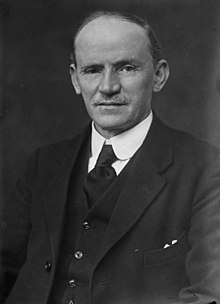Loading AI tools
English astronomer From Wikipedia, the free encyclopedia
Alfred Fowler, CBE FRS[1] (22 March 1868, in Yorkshire – 24 June 1940) was an English astronomer and spectroscopist. [2]
Alfred Fowler | |
|---|---|
 | |
| Born | 22 March 1868 Yorkshire, England |
| Died | 24 June 1940 (aged 72) |
| Awards | Valz Prize (1913) Gold Medal of the Royal Astronomical Society (1915) Royal Medal (1918) Henry Draper Medal (1920) Bruce Medal (1934) |
| Scientific career | |
| Fields | Astronomy |
He was born in Wilsden on the outskirts of Bradford, Yorkshire and educated at London's Normal School of Science, which was later absorbed into Imperial College, London.
Fowler was appointed Instructor (later Assistant Professor) of Astrophysics at Imperial College and worked there until his death. He was an expert in spectroscopy, being one of the first to determine that the temperature of sunspots was cooler than that of surrounding regions.
He was elected a Fellow of the Royal Society in 1910, when his citation read
Fowler was president of the Royal Astronomical Society from 1919 to 1921 and died in Ealing, London in 1940.

In 1896, Edward Charles Pickering published observations of previously unknown lines in the spectra of the star Zeta Puppis,[3] which he attributed to hydrogen.[4][5] Fowler managed to reproduce these lines experimentally from a hydrogen-helium mixture in 1912, and agreed with Pickering's interpretation that they were previously unknown features in the spectrum of hydrogen.[6] These lines became known as the Pickering–Fowler series[7] and turned out to be of great significance in understanding the nature of the atom.[8] Niels Bohr included a theoretical examination of these lines in his 'trilogy'[9][10] on atomic structure[11] and concluded that they had been wrongly attributed to hydrogen, arguing instead that they arose from ionised helium, He+.[12] Fowler was initially skeptical[13] but was ultimately convinced[14] that Bohr was correct,[9] and by 1915 "spectroscopists had transferred [the Pickering–Fowler series] definitively [from hydrogen] to helium."[8][15] Bohr's theoretical work on the series had demonstrated the need for "a re-examination of problems that seemed already to have been solved within classical theories" and provided important confirmation for his atomic theory.[8]
Awards
Named after him
Seamless Wikipedia browsing. On steroids.
Every time you click a link to Wikipedia, Wiktionary or Wikiquote in your browser's search results, it will show the modern Wikiwand interface.
Wikiwand extension is a five stars, simple, with minimum permission required to keep your browsing private, safe and transparent.